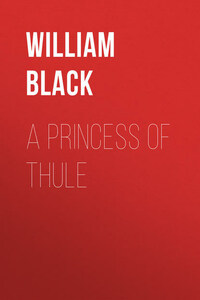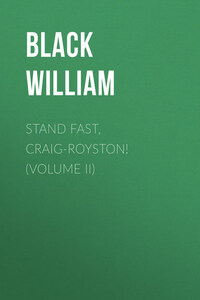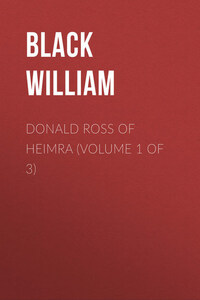CHAPTER I.
“LOCHABER NO MORE.”
ON a small headland of the distant island of Lewis, an old man stood looking out on a desolate waste of rain-beaten sea. It was a wild and wet day. From out of the lowering Southwest fierce gusts of wind were driving up volumes and flying rags of clouds, and sweeping onward at the same time the gathering waves that fell hissing and thundering on the shore. Far as the eye could reach, the sea and the air and the sky seemed to be one indistinguishable mass of whirling and hurrying vapor, as if beyond this point there were no more land, but only wind and water, and the confused and awful voice of their strife.
The short, thick-set, powerfully-built man who stood on this solitary point paid little attention to the rain that ran off the peak of his sailor’s cap, or to the gusts of wind that blew about his bushy gray beard. He was still following, with an eye accustomed to pick out objects far at sea, one speck of purple that was now fading into the gray mist of the rain; and the longer he looked the less it became, until the mingled sea and sky showed only the smoke that the great steamer left in its wake. As he stood there, motionless and regardless of everything around him, did he cling to the fancy that he could still trace out the path of the vanished ship? A little while before it had passed almost close to him. He had watched it steam out of Stornoway Harbor. As the sound of the engines came nearer and the big boat went by, so that he could have almost called to it, there was no sign of emotion on the hard and stern face, except, perhaps, that the lips were held firm and a sort of frown appeared over the eyes. He saw a tiny white handkerchief being waved to him from the deck of the vessel; and he said, almost as though he were addressing some one there:
“My good little girl!”
But in the midst of that roaring of the sea and the wind how could any such message be delivered? And already the steamer was away from the land, standing out to the lonely plain of waters, and the sound of the engines had ceased, and the figures on the deck had grown faint and visionary. But still there was that one speck of white visible; and the man knew that a pair of eyes that had many a time looked into his own – as if with a faith that such intercommunion could never be broken – were now trying, through overflowing and blinding tears, to send him a last look of farewell.
The gray mists of the rain gathered within their folds the big vessel and all the beating hearts it contained, and the fluttering of that little token disappeared with it. All that remained was the sea, whitened by the rushing of the wind and the thunder of waves on the beach. The man, who had been gazing so long down into the Southeast, turned his face landward and set out to walk over a tract of wet grass and sand toward a road that ran near by. There was a large wagonette of varnished oak and a pair of small powerful horses waiting for him there; and having dismissed the boy who had been in charge, he took the reins and got up. But even yet the fascination of the sea and of that sad farewell was upon him, and he turned once more, as if, now that sight could yield him no further tidings, he would send her one more word of good-by. “My poor little Sheila!” That was all he said; and then he turned to the horses and sent them on, with his head down to escape the rain, and a look on his face like that of a dead man.
As he drove through the town of Stornoway the children playing within the shelter of the cottage doors called to each other in a whisper and said: “That is the King of Borva.”
But the elderly people said to each other, with a shake of the head, “It iss a bad day, this day, for Mr. Mackenzie, that he will be going home to an empty house. And it will be a ferry bad thing for the poor folk of Borva, and they will know a great difference, now that Miss Sheila iss gone away, and there is nobody – not anybody at all – left in the island to tek the side of the poor folk.”
He looked neither to the right nor to the left, though he was known to many of the people, as he drove away from the town into the heart of the lonely and desolate land. The wind had so far died down, and the rain had considerably lessened, but the gloom of the sky was deepened by the drawing on of the afternoon, and lay heavily over the dreary wastes of moor and hill. What a wild and dismal country was this which lay before and all around him, now that the last traces of human occupation were passed! There was not a cottage, not a stone wall, not a fence, to break the monotony of the long undulations of moorland, which in the distance rose into a series of hills that were black under the darkened sky. Down from those mountains ages ago, glaciers had slowly crept to eat out hollows in the plains below; and now in those hollows were lonely lakes, with not a tree to break the line of their melancholy shores. Everywhere around were the traces of this glacier drift – great gray boulders of gneiss fixed fast into the black peat moss, or set amid the browns and greens of the heather. The only sound to be heard in this wilderness of rock and morass was the rushing of various streams, rain-swollen and turbid, that plunged down their narrow channels to the sea.














